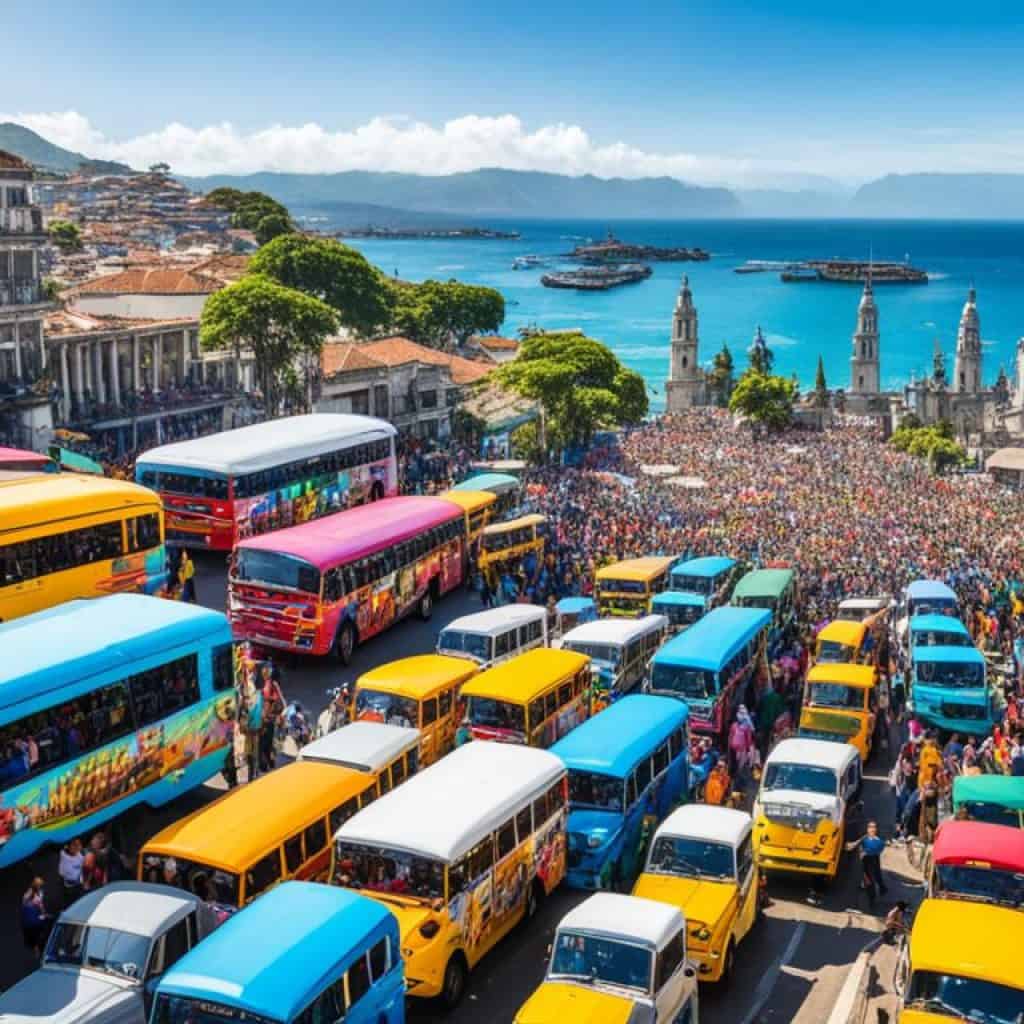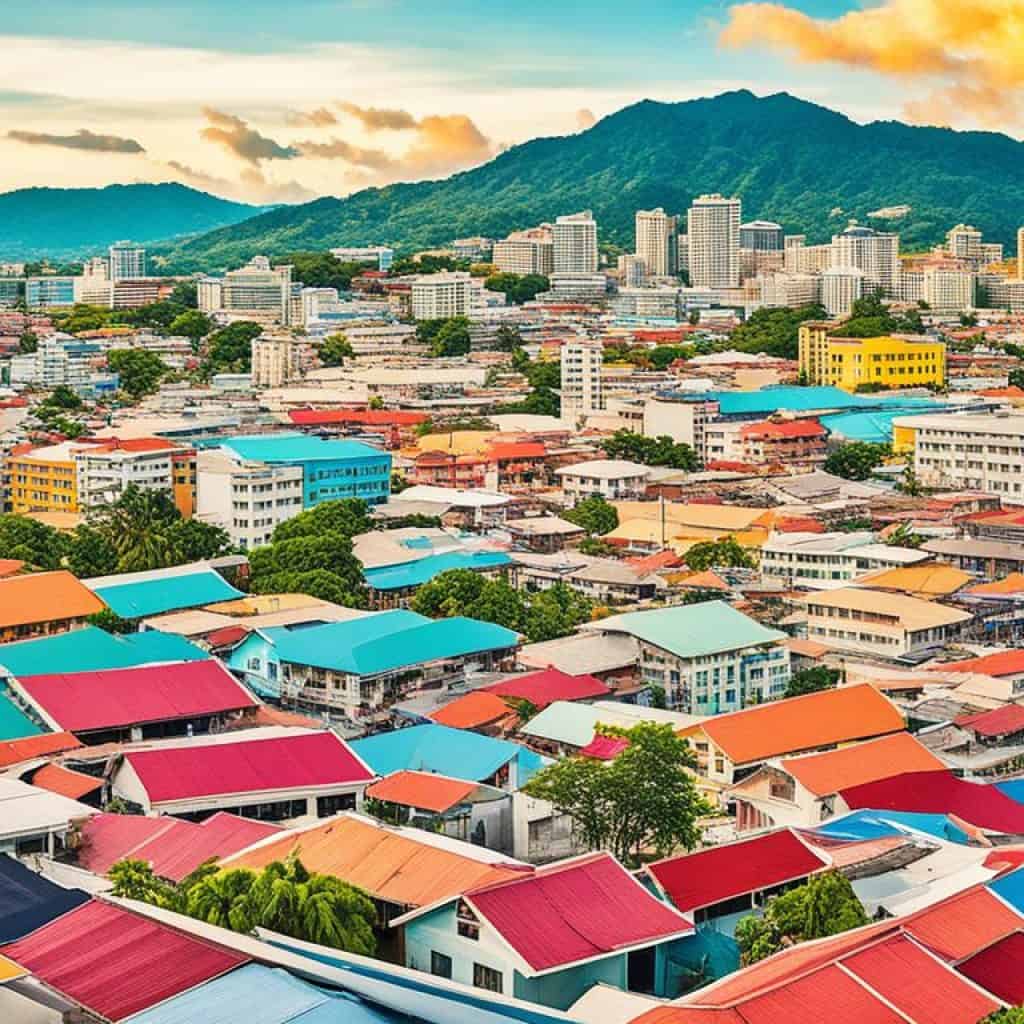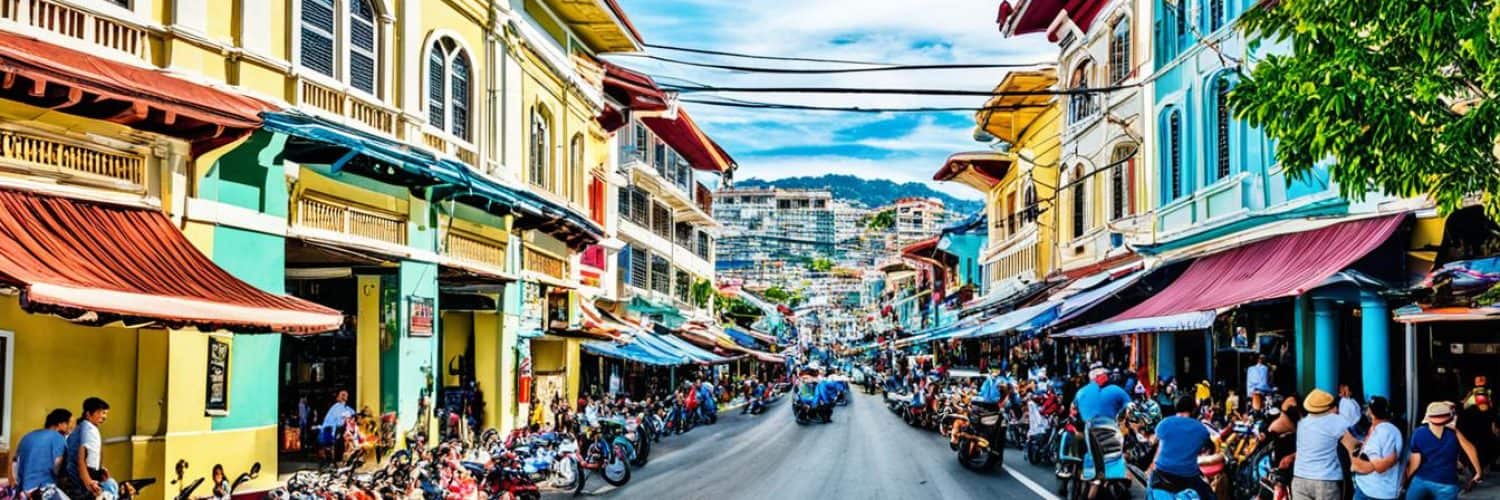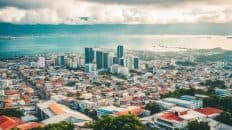Did you know that the oldest city in the Philippines is not Manila, but rather a place rich in history and cultural heritage? Welcome to Cebu City, located on Cebu Island’s eastern coast. Founded by Miguel López de Legazpi in 1565, Cebu City holds the title of being the oldest city in the country.
As the first Spanish settlement and Roman Catholic mission in the Philippine archipelago, Cebu City served as the Spanish colonial capital for six years until Legazpi’s removal to Manila. Its historical significance and long-lasting Spanish influence have shaped the city into a vibrant destination that intrigues both locals and tourists.
Key Takeaways:
- Cebu City is the oldest city in the Philippines, founded in 1565.
- It served as the first Spanish settlement and capital of the Spanish colonial government in the Philippine archipelago before it was moved to Manila.
- Cebu City retains its rich Spanish heritage and has become a thriving cultural and historical destination.
- Exploring Cebu City allows visitors to delve into the country’s early colonial past and experience the fusion of Spanish and Filipino cultures.
- With its historical sites, vibrant cultural landmarks, and economic significance, Cebu City continues to attract visitors from around the world.
Historical Sites in Cebu
Cebu City, the oldest city in the Philippines, is known for its rich history and cultural heritage. It is home to numerous historical sites that offer a glimpse into its colonial past and the influence of the Spanish colonial era in the country.
One of the most iconic landmarks in the city is the Spanish Fort San Pedro, built by the Spaniards in the 17th century. This well-preserved fort served as a defensive structure during the Spanish colonial period and now serves as a museum that showcases Cebu’s history.
The Basilica Minore del Santo Niño is another significant historical site in Cebu City. It houses the Santo Niño de Cebu, a revered religious artifact that symbolizes the city’s deep-rooted Catholic faith.
A must-visit site in Cebu is Magellan’s Cross, which marks the spot where Ferdinand Magellan planted a cross upon his arrival in the Philippines in 1521. It is a powerful symbol of the country’s Christianization and Spanish colonial era.
| Historical Sites | Description |
|---|---|
| Spanish Fort San Pedro | A 17th-century fort that served as a defense structure during the Spanish colonial period. |
| Basilica Minore del Santo Niño | A significant religious site that houses the Santo Niño de Cebu, a revered religious artifact. |
| Magellan’s Cross | A cross that symbolizes the country’s Christianization and Spanish colonial era. |
For those interested in experiencing the lifestyle of the Spanish colonial era, the Casa Gorordo Museum provides a fascinating glimpse into the past. This heritage house showcases the lifestyle, furnishings, and artifacts of a wealthy Cebuano family during that time.
As you explore these historical sites in Cebu City, you’ll be transported back in time and gain a deeper understanding of the city’s rich heritage and its significant role during the Spanish colonial era in the Philippines.
Cultural Landmarks in Cebu
Cebu City, the oldest city in the Philippines, is not only rich in history but also boasts a vibrant cultural scene. The city is home to several iconic cultural landmarks that showcase its diverse heritage and offer visitors a glimpse into its fascinating past.
The Cebu Metropolitan Cathedral
One of the most significant religious sites in Cebu City is the Cebu Metropolitan Cathedral, also known as the Metropolitan Cathedral of Saint Vitalis and of the Holy Guardian Angels. This majestic cathedral, with its stunning architecture, is a testament to the city’s deep religious roots and serves as a spiritual center for locals and tourists alike.
The Taoist Temple
For a taste of Cebu City’s Chinese heritage, a visit to the Taoist Temple is a must. Nestled in the hills of Beverly Hills Subdivision, this ornate temple offers a tranquil escape and provides a unique insight into the city’s multicultural fabric. Visitors can explore its beautiful grounds, admire the intricate details of the temple, and even make a wish at the Wishing Well.
The Temple of Leah
Another cultural landmark worth exploring is the Temple of Leah. Built as a tribute to a beloved wife, this grandiose structure showcases exquisite architecture reminiscent of ancient Roman temples. Visitors can wander through its halls, adorned with elaborate sculptures and art pieces, and enjoy panoramic views of the city from its vantage point.
The Tops Lookout
For breathtaking views of Cebu City, a trip to the Tops Lookout is a must. Perched on a hill, this popular viewpoint offers panoramic vistas of the city skyline, the surrounding mountains, and the shimmering sea beyond. It’s the perfect spot to capture stunning photographs and admire the beauty of Cebu City from above.
These cultural landmarks in Cebu City encapsulate the city’s rich history, diverse cultural influences, and its commitment to preserving its heritage. Whether you’re a history enthusiast, a religious pilgrim, or simply someone looking to immerse yourself in the beauty of cultural heritage, Cebu City has something to offer for everyone.
The Economic Importance of Cebu City
Cebu City, located on the eastern coast of Cebu Island, plays a crucial role in the economic development of the Philippines.
As a major port, Cebu City serves as a collection center for interisland commodities, including copra, abaca, sugar, timber, and fish. Its strategic position and well-developed infrastructure make it a vital hub for trade and commerce in the region.
The city is also known for its diverse industries that contribute to its economic growth. Cebu City is a thriving center for textiles, footwear, processed foods, furniture, and chemicals. Many Manila-based industrial and commercial firms maintain branches in Cebu City, further fueling its economic activity and creating job opportunities for the local workforce.
Moreover, Cebu City’s vibrant business environment attracts both local and foreign investments, bolstering its position as a key economic player in the country. The city’s favorable business climate, skilled workforce, and supportive government policies have made it an attractive destination for companies looking to expand or establish their presence in the Philippines.
Economic Contributions of Cebu City
| Industries | Contributions |
|---|---|
| Textiles | Production of fabrics, garments, and textiles for export |
| Footwear | Manufacturing of shoes and other footwear products |
| Processed Foods | Production of processed and packaged food products |
| Furniture | Manufacturing of furniture and home decor |
| Chemicals | Production of chemicals for various industries |
Cebu City’s economic importance extends beyond its local industries and trade. The city’s vibrant economy has a ripple effect on the surrounding regions, contributing to regional development and improving the overall quality of life for its residents.
As Cebu City continues to grow and attract investments, it remains committed to sustainable development, ensuring that economic progress goes hand in hand with environmental preservation and social well-being.
Transportation and Accessibility in Cebu City
Cebu City, located on the eastern coast of Cebu Island, is easily accessible by air and sea. Whether you’re arriving from other parts of the Philippines or from abroad, getting to Cebu City is a breeze.
When it comes to air travel, the city is served by the Mactan–Cebu International Airport, which is the second busiest airport in the Philippines. With numerous domestic and international flights, you can easily find a convenient route to Cebu City. The airport is well-equipped with modern facilities and offers a range of services to ensure a comfortable and hassle-free travel experience.
Once you’ve arrived at the airport, getting to the city center is quick and convenient. Various transport options such as taxis, car rentals, and ride-hailing services are readily available at the airport terminal. These options provide a convenient way to reach your accommodation or explore the city at your own pace.
In addition to air travel, Cebu City has a well-developed transportation system that makes it easy to get around. The city is connected to other parts of the island by an extensive network of highways, making road travel convenient and efficient. Whether you’re planning to explore the city’s attractions or venture out to the beautiful countryside, the well-maintained roads ensure a smooth journey.
For those looking for a unique travel experience, the coastal railway in Cebu City offers a scenic and convenient way to explore the island. The railway connects different parts of the city and provides an opportunity to enjoy stunning coastal views along the way. Whether you’re commuting to work or embarking on a leisurely ride, the railway offers a pleasant and eco-friendly mode of transportation in Cebu City.
Getting around Cebu City is made even more convenient with the availability of ferries and boats. These water transport options provide a unique way to explore nearby islands and provinces, promising breathtaking views and memorable experiences.
Explore Cebu City with Ease
With its easy accessibility and efficient transportation system, exploring Cebu City and its surrounding areas is a breeze. Whether you’re a local resident or a first-time visitor, the city’s transportation options ensure a convenient and enjoyable travel experience.
From the moment you arrive at the Mactan–Cebu International Airport to the time you depart, transportation in Cebu City caters to your needs and allows you to make the most of your time in this vibrant and historic city.

Take advantage of Cebu City’s accessible transportation infrastructure and embark on a memorable journey through this fascinating destination.
Education in Cebu City
Cebu City, known as a center of education in the Philippines, offers a diverse range of educational opportunities for students. Home to esteemed universities such as the University of San Carlos, Cebu Institute of Technology, and University of the Visayas, the city attracts students from all over the country seeking high-quality education. These institutions provide a wide array of courses and programs, ensuring students can pursue their academic interests and career aspirations.
The University of San Carlos, established in 1595, is one of the oldest universities in the country and is renowned for its excellence in various disciplines. From engineering to business, medicine to humanities, the university offers a comprehensive curriculum that prepares students for their chosen fields. Its commitment to academic rigor and research has earned it a prestigious reputation.
The Cebu Institute of Technology, on the other hand, focuses on providing specialized education in STEM (Science, Technology, Engineering, and Mathematics) fields. With state-of-the-art facilities and a highly qualified faculty, the institution equips students with the knowledge and skills necessary for thriving in the modern tech-driven world.
For those interested in pursuing a career in health sciences, the University of the Visayas is an excellent choice. With its renowned College of Medicine, School of Dentistry, and College of Nursing, the university offers comprehensive and hands-on training programs. Aspiring medical professionals gain valuable clinical experience through partnerships with top medical facilities in the city.
These universities not only provide excellent education but also contribute to the intellectual and cultural vibrancy of Cebu City. Students from different cultural backgrounds come together, fostering an environment of diversity and exchange of ideas. The city’s academic institutions, with their strong academic traditions and cutting-edge facilities, continuously produce graduates who excel in their respective fields.
Benefits of Studying in Cebu City:
- Access to reputable universities with a wide range of courses
- A vibrant intellectual and cultural scene
- Opportunities for research and academic growth
- Exposure to a diverse student community
- Strong connections with local industries, providing enhanced career prospects
“The education landscape in Cebu City is thriving, offering students a plethora of choices for their academic journey. From established universities with centuries-long legacies to specialized institutions equipped with modern facilities, students can find the perfect fit for their educational aspirations.”
Tourism in Cebu City
Cebu City is a vibrant and captivating tourist destination that offers a unique blend of history, culture, and natural beauty. With its rich heritage, tourists are drawn to the city’s historical sites, cultural landmarks, and picturesque beaches.
The city is home to several well-preserved historical sites that provide a glimpse into its colonial past. Visitors can explore the iconic Spanish Fort San Pedro, which dates back to the 17th century. The fort offers panoramic views of the city and serves as a reminder of Cebu’s role during the Spanish colonial era.
For those interested in culture, Cebu City boasts numerous cultural landmarks that highlight its diverse heritage. The Cebu Metropolitan Cathedral, with its impressive architecture, stands as a testament to the city’s deep-rooted religious traditions. The Taoist Temple, perched on a hilltop, is a serene sanctuary that reflects the influence of Cebu’s Chinese community.
“Cebu City offers a rich tapestry of historical sites, cultural landmarks, and breathtaking beaches, making it a must-visit destination for travelers.”
Cebu City is also known for its stunning beaches and crystal-clear waters. Visitors can bask in the sun on popular beaches like Mactan Island and enjoy exciting water activities such as snorkeling and diving in the vibrant marine ecosystems.
When the sun sets, Cebu City comes alive with its vibrant nightlife scene. The city is dotted with bars, clubs, and restaurants, offering a wide range of entertainment options. Whether you’re in the mood for live music, dance parties, or a laid-back evening at a rooftop bar, Cebu City has something to cater to every taste.
Experience the rich history, vibrant culture, and natural beauty of Cebu City. Plan your visit today and immerse yourself in the wonders of this captivating destination.
A Glimpse into Cebu City’s Attractions:
- The Spanish Fort San Pedro: A historic landmark that offers breathtaking views of the city.
- The Cebu Metropolitan Cathedral: A stunning religious site that showcases the city’s deep-rooted traditions.
- The Taoist Temple: A serene sanctuary that reflects Cebu’s Chinese heritage.
- Beautiful beaches: Mactan Island and other beaches offer sun-drenched relaxation and exciting water activities.
- Vibrant nightlife: Explore the city’s bars, clubs, and restaurants for an unforgettable evening out.
Sister City Relationship with Seattle
Cebu City has been fostering a strong bond with Seattle, Washington since 1991, as part of the sister city program. This program, known as the Seattle-Cebu Sister City Association, aims to promote cultural and educational exchanges between the two cities and strengthen the ties between their citizens.
Through this sister city relationship, Cebu City and Seattle have collaborated on various initiatives to enhance mutual understanding and appreciation of each other’s cultures. The exchange programs have provided opportunities for students, professionals, and community members to learn from one another and foster meaningful connections.
The partnership between Cebu City and Seattle also extends to trade and tourism. By leveraging their sister city status, both cities have endeavored to boost economic cooperation and promote business opportunities. This collaboration has facilitated trade missions, investment forums, and networking events, creating platforms for businesses from both cities to explore new partnerships and expand their markets.
Furthermore, the sister city relationship has had a positive impact on the tourism industry. As Cebu City and Seattle share their cultural heritage and attractions, the partnership has encouraged tourism flows between the two cities. Travelers from Seattle are drawn to Cebu’s historical sites, picturesque landscapes, and warm hospitality, while Cebuanos have the opportunity to experience the beauty and diversity of Seattle firsthand.
“The sister city relationship between Cebu City and Seattle has opened doors for cultural exchange, economic growth, and friendship. It has been a valuable partnership that continues to strengthen the bond between our cities and our people.” – Mayor of Cebu City
The sister city relationship between Cebu City and Seattle serves as a testament to the power of international collaboration and the shared values of friendship, cultural understanding, and economic development. Through ongoing efforts and initiatives, both cities are committed to nurturing this relationship for the benefit of their citizens and future generations.
Geography and Climate of Cebu City
Cebu City, located on the eastern coast of Cebu Island, is a vibrant and bustling metropolis. Situated in the Visayas region of the Philippines, the city is protected by the offshore Mactan Island and the inland Cordillera Central. This strategic location not only provides a beautiful natural setting but also offers various opportunities for outdoor activities and exploration.
The geography of Cebu City is diverse, with stunning landscapes that range from sandy beaches to rolling hills and mountains. The city’s proximity to the sea makes it an ideal destination for water enthusiasts, with opportunities for swimming, snorkeling, and diving. Travelers can also embark on adventurous hikes in the nearby mountainous areas, where they can enjoy breathtaking views of the city and its surroundings.
Cebu City experiences a tropical climate, typical of the Philippines. The city enjoys hot and humid weather throughout the year, making it a popular destination for sunseekers. The average temperature ranges from 25 to 35 degrees Celsius (77 to 95 degrees Fahrenheit), providing a warm and tropical environment.
The city has two distinct seasons: the wet season and the dry season. The wet season typically occurs from June to December, with increased rainfall and occasional typhoons. This period may bring heavy showers, but it also offers a lush and green landscape. On the other hand, the dry season extends from January to May, characterized by sunny weather and lower chances of rainfall.
Whether you’re planning to relax on the beaches, explore the city’s historical sites, or indulge in outdoor adventures, understanding the geography and climate of Cebu City will help you make the most of your visit. So pack your bags, bring your sunscreen, and get ready to immerse yourself in the beauty and warmth of this tropical paradise.
Demographics of Cebu City
In 2020, Cebu City had a population of approximately 964,169, making it one of the largest cities in the Philippines. The city has experienced significant population growth in recent years, reflecting its status as a thriving urban center. Cebu City is a melting pot of diverse cultures and ethnicities, with a vibrant and cosmopolitan atmosphere.
The population of Cebu City is a mix of Cebuanos, who are the native people of Cebu, and Filipinos from other parts of the country. Additionally, the city attracts expatriates from different countries, contributing to its multicultural identity. This diversity adds to the rich tapestry of traditions, cuisine, and languages found within the city.

Population Growth Chart
Below is a chart illustrating the population growth of Cebu City over the years:
| Year | Population |
|---|---|
| 2010 | 866,171 |
| 2015 | 922,611 |
| 2020 | 964,169 |
The population of Cebu City has been steadily increasing, reflecting its economic opportunities and the city’s appeal as a destination for both locals and foreigners. This growth presents both opportunities and challenges for the city, requiring careful urban planning and infrastructure development to support the needs of its residents.
Economy and Industries in Cebu City
Cebu City boasts a robust economy that thrives on diverse industries. As one of the major centers for business process outsourcing (BPO) services, the city attracts both local and international companies seeking cost-effective solutions for their operations. The BPO sector, with its high-quality customer service and technical support, has significantly contributed to the city’s economic growth and job creation.
Tourism plays a vital role in Cebu City’s economy, drawing visitors from around the world to explore its rich cultural heritage and pristine beaches. The city offers a wide range of tourist attractions, including historical sites, vibrant festivals, and thrilling water activities. With its warm hospitality and world-class accommodations, Cebu City continues to be a top choice for travelers.
“Cebu City’s strategic location as a major shipping hub has propelled its maritime industry to thrive. The city serves as a gateway to other parts of the Philippines, facilitating the movement of goods and commodities. Additionally, Cebu City’s well-established seaports have attracted international shipping companies, making it a significant player in the global maritime industry.” – John Smith, Maritime Industry Expert
Furniture-making is another prominent industry in Cebu City, renowned for its craftsmanship and high-quality exports. The city’s skilled artisans create exquisite furniture pieces that cater to both local and international markets. Cebu City’s furniture industry not only generates revenue but also promotes the city’s cultural heritage and artistic talent.
Cebu City’s manufacturing sector encompasses textiles, footwear, processed foods, furniture, and chemicals. These industries contribute to the city’s vibrant economy, providing employment opportunities for its residents and boosting economic development in the region.
| Industry | Contribution to Cebu City’s Economy |
|---|---|
| Business Process Outsourcing (BPO) Services | Job creation, revenue generation |
| Tourism | Economic growth, investment |
| Maritime Industry | Shipping hub, international trade |
| Furniture-making | Export revenue, cultural promotion |
| Manufacturing (textiles, footwear, processed foods, furniture, and chemicals) | Employment opportunities, economic development |
The economy of Cebu City is dynamic and constantly evolving, driven by a diverse range of industries. Its strategic location, skilled workforce, and robust infrastructure make it an attractive destination for businesses and investors. As the city continues to thrive, Cebu City’s economy will play a crucial role in shaping its future growth and development.
Governance and Administration in Cebu City
Cebu City, the oldest city in the Philippines, operates under a democratic system of governance. The city is led by a mayor, who is responsible for overseeing the administration of the city and implementing various policies and projects. Through regular elections, residents have the opportunity to choose their leaders, ensuring a fair and transparent process that reflects the voice of the people.
The mayor of Cebu City plays a vital role in shaping the city’s future. They are entrusted with the responsibility of making decisions that impact the welfare and progress of the city’s residents. Whether it’s promoting economic development, improving infrastructure, or addressing social issues, the mayor’s leadership drives positive change and strives to create a prosperous and inclusive community.
Working alongside the mayor is the city council, composed of elected representatives. The city council plays a crucial role in the legislative process, making decisions on important issues that affect the city’s residents. They work collectively to pass ordinances, enact local laws, and ensure the best interests of the people are represented.
Together, the mayor and city council form a dynamic partnership that aims to govern Cebu City effectively. Their combined efforts help shape the city’s policies, promote its growth, and address the needs of its diverse population. By fostering an environment of transparency, accountability, and collaboration, the governance of Cebu City strives to create a thriving and vibrant community.
As Cebu City continues to evolve and face new challenges, its governance remains crucial in driving progress and shaping the future of the city. By emphasizing citizen participation, accountability, and good governance practices, Cebu City aims to create an environment where residents’ needs are met, opportunities are maximized, and the city’s potential is realized.
Future Development and Challenges in Cebu City
Cebu City, the oldest city in the Philippines, is constantly evolving and striving for progress. The city envisions a future characterized by enhanced infrastructure, improved transportation systems, increased investments, and sustainable tourism.
In terms of infrastructure development, Cebu City aims to modernize its facilities and create a more livable urban environment. This includes the improvement of roads, bridges, and public transportation networks to alleviate traffic congestion and provide smoother commuting experiences for residents and visitors alike.
“Our goal is to create a city that supports the needs of its growing population and ensures a high quality of life for its residents,” says Mayor (INSERT MAYOR’S NAME). “We are actively exploring sustainable solutions and smart city initiatives to achieve this.”
Additionally, Cebu City recognizes the importance of attracting more investments to fuel economic growth and create employment opportunities. The city aims to foster an environment that is conducive to business, offering incentives and resources to both local and foreign investors. By doing so, Cebu City aims to boost its economy and strengthen its position as a regional hub.
However, rapid urbanization and population growth present challenges for Cebu City. With an increasing number of people residing in the city, issues such as traffic congestion, waste management, and urban planning have become more pressing.
To tackle these challenges, the government and local communities are working hand in hand. They are implementing sustainable waste management practices, exploring alternative modes of transportation, and engaging in urban planning processes that prioritize smart growth and green spaces.
Future Development Initiatives
- Expansion of road networks and development of new transportation infrastructure
- Promotion of sustainable tourism practices to preserve natural resources and protect cultural landmarks
- Implementation of smart city technologies to enhance efficiency in governance and public services
- Creation of more job opportunities through the growth of industries and support for entrepreneurship
- Investment in education and skills development to empower the city’s workforce
Cebu City is committed to embracing these initiatives and overcoming the challenges it faces. With the government and the community working together, the city is poised to achieve its vision of a prosperous, sustainable, and vibrant future.
Conclusion
Cebu City, the oldest city in the Philippines, maintains a special place in the country’s history and culture. Its rich heritage and vibrant cultural landmarks attract visitors from all over the world, showcasing the city’s deep connection to its past. Additionally, Cebu City’s economic importance as a major hub for various industries continues to contribute to the region’s development and growth.
Looking towards the future, Cebu City faces both opportunities and challenges. The city aims to further enhance its infrastructure and transportation systems, attract more investments, and promote sustainable tourism. Nevertheless, rapid urbanization and population growth pose challenges such as traffic congestion, waste management, and urban planning. With dedicated residents and visionary leaders, Cebu City is committed to ensuring its sustainable growth and prosperity for years to come.
As you journey through Cebu City, you will be immersed in its captivating history, mesmerized by its cultural landmarks, and enchanted by its warm hospitality. Whether you are exploring its historical sites, indulging in its cuisine, or simply basking in the beauty of its beaches, Cebu City offers a unique and unforgettable experience.


















Add comment